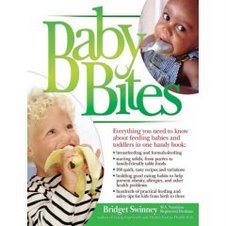A new study out today from the CDC (http://www.msnbc.msn.com/id/18395089/) shows that kids are getting more cavities earlier--bad news for the teeth of 2-5 year olds, 28% of whom have cavities. Dental experts fear that cavities in baby teeth may also mean more cavities in adult teeth. And, if teeth have to be extracted due to extensive decay, that can lead to overcrowding of adult teeth--and perhaps a higher chance of braces? (Braces? you don't want to go there if you can help it--best to learn more about how to take care of you baby's teeth!)
How Can You Prevent Cavities in Your Baby and Toddler?
Read the following excerpt from Baby Bites (available from Amazon.com):
How Do Cavities Happen?
It’s a a simple equation: Sugar or starch + bacteria in the mouth + time = acid that destroys tooth enamel and makes a small hole or cavity.
How do you prevent cavities?
That’s relatively simple, too: If you remove any part of the equation, no cavities can
occur. Let’s look at the parts more closely.
Sugar and Starch
Sugars and cooked starches (collectively
called fermentable carbohydrates) are the
only foods that can cause cavities.
Sugar is the number one cavity-causing ingredient. Sticky sugars—caramel, gum,
dried fruit, toffee, taffy, and other chewy or sticky sweets—are especially bad. Because they stick to teeth, they provide an ongoing snack for bacteria. You also need to watch out for sweet drinks. Bacteria use added sugars
in beverages, like sucrose, very efficiently.
Sweet drinks like soda, lemonade, and sports drinks also contain acid, which contributesto cavity-making. Recent research shows that even cough syrups can causecavities because they’re both sweet and acidic.
Starchy foods like bread, potato chips, and pretzels are also cavity-causing.
Research shows that some starchy foods linger on the teeth longer than some typesof candy. Five minutes after eating, there are more food particles left in the mouth from plain donuts, potato chips, cookies, or saltine crackers than from caramel,milk chocolate, or milk chocolate–caramel bars.
Bacteria
The lead cavity-causing bacteria is Mutans streptococci. This bacteria converts the sugar in the mouth into acid. Chances are, this bacteria gets into your baby’s mouth courtesy of you! Mothers are the prime suspects in the transfer of salivary bacteria to babies’ mouths via shared utensils, food, and even kisses. If you have active or untreated cavities, or if you eat a lot of sugar, you’re at higher risk of transferring bacteria to your baby.
The best ways to reduce bacteria in your mouth are eating a healthy diet and practicing proper dental care--that is wiping the teeth with gauze or a baby toothbrush after your baby eats or drinks.
Some people are more prone to cavities than others because they tend to have more cavity-causing bacteria than others. This tendency has a genetic component: If mom and/or dad has more bacteria, their child probably will, too.
Time
After bacteria converts sugar or starch in the mouth into acid, it takes twenty to forty minutes for saliva to neutralize or wash away the acid. So the more often you eat sugar or starch and the longer it stays on your teeth, the more acid bacteria can produce.
Dental Hygiene
See a tooth? Brush it. Then, see a dentist.
A consumer poll done by the Academy of General Dentistry showed that 70
percent of parents wait until their child is three years old to see a dentist. This is way too late! By this age, about 25 percent of kids will already have cavities. Even waiting until age two is too late—at this age, one out of every ten kids already has a cavity.
The best time to visit a dentist is within six months of your baby’s first tooth
appearing. This first visit is simple, educational, and friendly. The dentist usually discusses hygiene techniques and takes a quick look at your baby’s teeth while your baby sits on your lap.
From: Baby Bites, by Bridget Swinney MS, RD, Copyright 2007. Meadowbrook Press
Subscribe to:
Post Comments (Atom)





1 comment:
Parents should focus on how to take care of your child’s teeth to avoid mouth and teeth diseases. You have to guide you children. First, teaching them to brush their teeth, second, as much as possible avoid giving them too many sugary foods and lastly, taking them to the dentist regularly. Remember that parents should be a role model for your kids. Keep them in mind these three important ways to prevent gum diseases.
Teeth whitening
Post a Comment